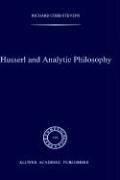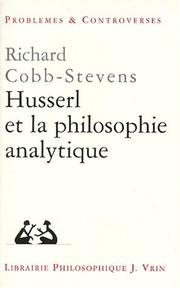| Listing 1 - 6 of 6 |
Sort by
|

ISBN: 0792304675 9401073422 9400918887 9780792304678 Year: 1990 Volume: 116 Publisher: Dordrecht Kluwer
Abstract | Keywords | Export | Availability | Bookmark
 Loading...
Loading...Choose an application
- Reference Manager
- EndNote
- RefWorks (Direct export to RefWorks)
The principal differences between the contemporary philosophic traditions which have come to be known loosely as analytic philosophy and phenomenology are all related to the central issue of the interplay between predication and perception. Frege's critique of psychologism has led to the conviction within the analytic tradition that philosophy may best defend rationality from relativism by detaching logic and semantics from all dependence on subjective intuitions. On this interpretation, logical analysis must account for the relationship of sense to reference without having recourse to a description of how we identify particulars through their perceived features. Husserl' s emphasis on the priority and objective import of perception, and on the continuity between predicative articulations and perceptual discriminations, has yielded the conviction within the phenomenological tradition that logical analysis should always be comple mented by description of pre-predicative intuitions. These methodological differences are related to broader differences in the philosophic projects of analysis and phenomenology. The two traditions have adopted markedly divergent positions in reaction to the critique of ancient and medieval philosophy initiated by Bacon, Descartes, and Hobbes at the beginning of the modern era. The analytic approach generally endorses the modern preference for calculative rationality and remains suspicious of pre-modern categories, such as formal causality and eidetic intuition. Its goal is to give an account of human intelligence that is compatible with the modern interpretation of nature as an ensemble of quantifiable entities and relations.
Philosophy of language --- Theory of knowledge --- Husserl, Edmund --- Analyse (Filosofie) --- Analyse (Philosophie) --- Analyse linguistique (Philosophie) --- Analysis (Philosophy) --- Analysis [Linguistic ] (Philosophy) --- Analysis [Logical ] --- Analysis [Philosophical ] --- Analytical philosophy --- Analytische filosofie --- Fenomenologie --- Filosofische taalanalyse --- Intuitie --- Intuition --- Linguistic analysis (Filosofie) --- Linguistic analysis (Philosophy) --- Logical analysis --- Perceptie --- Perceptie (Filosofie) --- Perception --- Perception (Philosophie) --- Perception (Philosophy) --- Phenomenology --- Philosophical analysis --- Philosophie analytique --- Philosophy [Analytical ] --- Phénoménologie --- Psychologism --- Psychologisme --- Waarneming --- Waarneming (Filosofie) --- Husserl, Edmund, --- Phenomenology. --- Psychologism. --- Perception. --- Intuition. --- 1 HUSSERL, EDMUND --- Academic collection --- #GROL:SEMI-1-05'19' Huss --- Phenomenological psychology --- Philosophy, Modern --- Supraliminal perception --- Cognition --- Apperception --- Senses and sensation --- Thought and thinking --- Intuition (Psychology) --- Intuitionalism --- Insight --- Analysis, Linguistic (Philosophy) --- Analysis, Logical --- Analysis, Philosophical --- Analytic philosophy --- Philosophy, Analytical --- Language and languages --- Methodology --- Philosophy --- Logical positivism --- Semantics (Philosophy) --- Filosofie. Psychologie--HUSSERL, EDMUND --- 1 HUSSERL, EDMUND Filosofie. Psychologie--HUSSERL, EDMUND --- Analysis (Philosophy). --- Phénoménologie --- Husserl, Edmond --- Husserl (edmund), philosophe allemand, 1859-1938 --- Critique et interpretation --- Philosophie analytique.
Book
Year: 1974 Publisher: The Hague : Martinus Nijhoff,
Abstract | Keywords | Export | Availability | Bookmark
 Loading...
Loading...Choose an application
- Reference Manager
- EndNote
- RefWorks (Direct export to RefWorks)

ISBN: 2711613542 9782711613540 Year: 1998 Publisher: Paris Vrin
Abstract | Keywords | Export | Availability | Bookmark
 Loading...
Loading...Choose an application
- Reference Manager
- EndNote
- RefWorks (Direct export to RefWorks)
Analysis (Philosophy) --- Phenomenology. --- Psychologism. --- Intuition. --- Philosophie analytique --- Phénoménologie --- Psychologisme --- Intuition --- Husserl, Edmund, --- Criticism and interpretation --- Phénoménologie --- Criticism and interpretation.
Book
Abstract | Keywords | Export | Availability | Bookmark
 Loading...
Loading...Choose an application
- Reference Manager
- EndNote
- RefWorks (Direct export to RefWorks)
Book
ISBN: 2905670339 9782905670335 Year: 1992 Publisher: T.E.R.,
Abstract | Keywords | Export | Availability | Bookmark
 Loading...
Loading...Choose an application
- Reference Manager
- EndNote
- RefWorks (Direct export to RefWorks)
Book
ISBN: 9783319020181 9783319020198 9783319020174 9783319349879 331902017X Year: 2015 Publisher: Dordrecht Springer
Abstract | Keywords | Export | Availability | Bookmark
 Loading...
Loading...Choose an application
- Reference Manager
- EndNote
- RefWorks (Direct export to RefWorks)
In this collection of essays, the sophistication and vibrancy of contemporary phenomenological research is documented, including both its engagement with key figures in the history of philosophy, and with critical problems defining future directions of philosophical investigations. It honors the writings of Richard Cobb-Stevens, whose work in phenomenological philosophy, analytic philosophy and the history of philosophy has served as model for generations of philosophers working between these three fields of research. The essays collected in this volume provide a unique window on the contemporary state of the art in phenomenological philosophy by leading scholars of international reputation from North America and Europe. Historical figures such as Aristotle and Hobbes are innovatively brought into dialogue with phenomenological thinking. Phenomenological thinking is brought to bear on a wide variety of problems, from the nature of artworks and photography to questions concerning consciousness and knowledge. Among the topics discussed in these specially commissioned essays: phenomenology and Aristotle; the nature of the primal ego; Hobbes and Husserl; intentionality and reference; Neo-Aristotelian ethics; Husserl and Wittgenstein; photography; the nature of artworks.
Philosophy --- History of philosophy --- filosofie --- geschiedenis --- existentialisme --- Phenomenology --- Philosophy, Modern
| Listing 1 - 6 of 6 |
Sort by
|

 Search
Search Feedback
Feedback About UniCat
About UniCat  Help
Help News
News